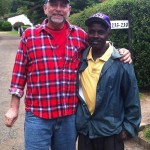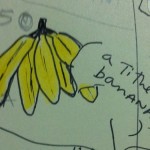
Friday, Feb. 1
“Juzi Juzi”
We’ve been learning about time in Swahil. My current favorite term is, “Juzi Juzi” which means just “The Other Day.” I’ve heard Louisiana country men use the phrase all of my life. Whether they’re standing line at Foreman’s Meat Market, in the front of the post office, or on aisle 8 at WalMart.
“Well, just the other day, I told the old lady…”


Yes, we have no Ndzee
Learning a new language is an experience.
It’s really stretching my fifty-six year old Southern Redneck tongue.
I supply lots of unintended humor to the Kenyans who are trying to teach me as well as the poor souls I practice on daily.
Banana trees are plentiful in East Africa. The KwiSwahili* word for banana is “ndzee.” I’m still trying to get the word right. The n is nearly silent and their e is pronounced as “eye.”
As our teacher, Petero, vainly tried to help me pronounce “banana/ndzee,” I asked, “Have you ever heard the song, “Yes, We Have No Bananas”?
Enjoy the Muppet’s “Swedish Chef” version of “Yes, We have No Bananas” http://www.youtube.com/watch?v=PrmBWtOWYsA
Or watch this 1930 cartoon on the song: http://www.youtube.com/watch?v=HygopC4S5W0
Petero laughed the rich Kenyan laugh I’ve grown to love. “What did you just say?”
I explained about the song from the early 20th century, “Yes, We Have No Bananas/Ndzee.” Petero shook his head at me, his oldest student.
DeDe also shook her head. “If you don’t quit telling “Hadithi” (story) about every word and phrase we learn, we’re going to finish this class about 2016.”
Enjoy the Muppet’s “Swedish Chef” version of “Yes, We have No Bananas” http://www.youtube.com/watch?v=PrmBWtOWYsA
Or watch this 1930 cartoon on the song: http://www.youtube.com/watch?v=HygopC4S5W0
* * *
Then, last Sunday, a wonderful Hadithi was shared during worship at Hope Baptist Church. My new friend, Glen Moore, was leading a Bible study on tithing and giving our “first fruits” to the Lord. He shared about a recent experience with ndzee. One of the members brought a box/stalk of homegrown bananas as his first fruits offering.
The church decided how to use the bananas: They had a Baptist auction. Except it was a Kenyan Baptist offering. The bids were cumulative. If you bid 10 shillings and a bidder topped you at 20 shillings, you both must pay.

The auction was completed with numerous bids and a sizable amount given for the bananas. The accumulated monies were given to the church to help the poor in the community.
But they still had a box of bananas to do something with. The congregation gave the bananas to Glen and his wife Jeri. Jeri took them home and prepared a whole boatload of banana bread, brought it to church the next Sunday, and they had a true Baptist fellowship meal.
I like that story. It illustrates the spirit behind an offering of “first fruits.” Giving our best to the Lord and allowing Him to multiply it. According to the Bible, He has a pretty good track record at taking food, multiplying it in amazing ways, and not wasting a scrap.
And I learned (or re-learned) this lesson at a small dirt-floored church not far from, you guessed it, the Banana Hill Road leading into Nairobi.
Oh by the way, thinking of Jeri’s boatload of banana bread, have you ever seen the song, “Day-Oh: The Banana Boat Song?” It’s used in a hilarious scene from the American movie, “Beetlejuice.”
http://www.youtube.com/watch?v=i3j9jpBez8g&list=FL1VaG4D1vPdYcJ74S6a_B4g&feature=mh_lolz
Well, that’s a hadithi for another time.
Some of you are probably thinking, “I thought we sent you to Africa to do something, not tell a bunch of stories.” Stories are who I am. They have a God-given power to connect hearts in an amazing way.
I’m learning from the stories of folks I meet daily, and I’m having opportunity to tell my stories. Or better yet, God’s story. The best story of all: the story of Jesus.
“The shortest distance between the truth and a human heart is a story.”
-Anthony DeMello
You don’t have to travel to Africa, or even Abbeville or Arcadia, to gather stories. They’re all around you—hanging like fruit from, you guessed it, a ndzee tree.
*KwiSwahili literally means “Language of Swahili.” It’s the trade language
of East Africa.
You can learn more about the concept of first fruits and tithing in these scriptures:
Leviticus 27:30
Deuteronomy 26:1-2
Malachi 3:6-12
II Corinthians 9:7

 Creekbank Stories Curt Iles, Storyteller
Creekbank Stories Curt Iles, Storyteller




DeDe, as much as you think you know your Dear Curt, you are going to learn even more about him these two years.
Once a story teller, always a story teller. Juzi Juzi …
By the way, DeDe, when will we be seeing your blog posts?
Love ya, Linda
It’s never dull!